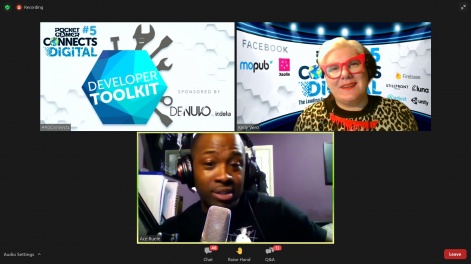March 8th, 2021 is International Women’s Day, an annual celebration of achievements for women all over the world.
In a world that feels so equal, we often hear echoes of ‘women can do everything that men do, why do we need this day?’. While that does ring true thanks to the tireless efforts of those that paved the way, many industries are still not the level playing field that they can and should be, and that includes the global games industry.
With that in mind, our Jobs in Games section this week is dedicated to showcasing incredible women working in the games industry, from all backgrounds and disciplines. We’ll be sharing insight, stories and advice from some of the industry’s most talented women.
Today we're chatting to Kelly Vero, games industry extraordinaire, published author and no-nonsense advocate for girls in tech. Vero shares with us her experience across 25 years in games, the comments that initially turned her away, and why this industry is not just a young person's game.
PocketGamer.biz: Can you tell us about your current role and what it entails?
Kelly Vero: I work with game studios to produce quality games for publishing. In a sense, I am a curator of loads of different games across mobile and console. Traditionally, executive producers are the conduit between the investment and the development, so I have a close eye on not only budget, but more importantly the standards of development, production; the quality of the game itself, the teams and the marketplace at large.
How did your journey into games begin, and did you always want to work in games?
I started like most people during the games industry doing something totally different. I had always wanted to work in the games industry and as such, I set about learning how to code from a young age, but by the time I went to see my careers officer as I was leaving school, it was met with disappointment and disdain that I didn’t choose to do something more feminine.
So in that conversation, I probably had three career goals and with left one: a YTS. I was certainly considered either not prodigious enough for computer science and not intelligent enough to do Classics. I managed to do both things in my life. My path into the video games industry is quite weird because I went through music and entertainment, and even soap operas first. The but day zero of me going into the games industry actually happened in an LGBTQ bar in my hometown where I worked.
What do you find are the most common misconceptions, public or professional, about women working in games?
We can still like bikinis, unicorns and pink cats when we’re kicking you in the balls for not doing unit tests
Thanks to the mid-00s, a common misconception is that women in the games industry get their tits out a lot. Booth girls and Frag girls put our cause back by 20 years or more. However, a professional misconception is that all women do in the games industry is the soft stuff like marketing or project management and that we don’t get our hands dirty in coding, for example. I guess what I’m saying is we can still like bikinis, unicorns and pink cats when we’re kicking you in the balls for not doing unit tests.
Is there anything about the job/industry you wish you would have known when first joining?
As with many other jobs in similar industries like banking or IT, there are millions of things that I wish I would’ve known when first joining. For example, it can be hard to make friends in an industry that is both super social and anti-social all at the same time. But when you do, you make friends for life!
I think that there's also this misconception that if you start making games you will never not make games. Well, that's not true either because a lot of people I come to count on as close friends or family no longer work in the industry at all. Additionally, don't get comfortable. Games studios bang and bust with an almost clockwork precision. It's one of the few careers that you should have a 5-year plan for in actual fact. Set your sights on a goal of the perfect game, team or studio and work towards getting there. I'm still trying to work on my dream project and I've been doing this for 25 years.
Fun-fact: When I was a kid I used to get a magazine I think it was called the ZX Spectrum monthly: on the front cover of one of the editions was Chris and Tim Stamper standing next to a Lamborghini and a Porsche or some other proto-super car. And they remain the key motivators for me who wanted to join the games industry. So I suppose I wish somebody had told me that if I join the games industry, I was never actually going to own a Lamborghini.

Do you feel female characters are better represented in video games today, as opposed to when you entered the industry?
Yes and no, I think that female characters throughout the history of video games have taken on particular characteristics that paint them positively and negatively as females and role models for gamers everywhere.
However, 'isms' are in the eyes of the beholder. Lara Croft was always viewed upon as poor role-model yet she was most definitely, in the 90s at least a powerful figure of feminism and what it means to be a single woman of that time and of the future. How we read into every female from Jill Valentine to Bayonetta is oftentimes about how we see ourselves in games.
I'm quite annoyed by the profusion of male protagonists in games currently, and it's important that we don't take a backward step. Enchanted Arms came out in maybe 2008 and they were already playing with the idea of gender roles and yet we don't use that example as good practice when thinking about the problems we're going to solve in game society. It's not about this or that, it's about the stories that games tell us about ourselves through strong characterisation and I'm afraid if Tom Clancy games are only going to give us Jack Ryan or Ding Chavez's wife, then we have even bigger problems than we ever thought when we were making Horace Goes Skiing.
Can you tell us about some of the biggest challenges you have encountered since joining the industry?
Fortunately, the games industry has mostly been plain sailing for me. And that might be because I actually don’t take prisoners. You would be better off asking some of the people that I’ve worked with who I’m sure will tell you that they probably don’t appreciate some lanky gobshite telling them how to do their job.
That said, the biggest challenges that I have had since joining the industry didn’t really happen until very, very recently when I was in a board meeting, let’s call it a sausage fest, with a game studio we'd hired to make an IP. All the men were talking over me making decisions about my game without my buy-in on the solutions. My then CEO, who is absolutely amazing by the way, notices my resting bitch face and asks me if this is a problem. To which I said yes, so we cancelled the project with this particular sausage fest. I should also say that my wonderful CEO is a man. And he could see the damage that this particular 'ism' was doing to the conversation. So he trusted in my vision and we canned the project quickly.
Another challenge I would probably say is about games belonging to young people in the industry. I don’t believe that that’s entirely true and a lot of us, not just females, struggle with the age questions in the games industry. Such as: when is it a good time to step away from the crunch? The answer is stop crunching - don't step down because you're 40 or 45. Step up and say that crunching is bullshit instead.
Don't step down because you're 40 or 45. Step up and say that crunching is bullshit instead.
I hate it when my peers say "I'm too old for this shit." I'm not too old for anything. When do you resign to the fact that game development is for young people? And why would you? I don’t think any of us should. But I don’t think that we should try and prove that we are relevant because we're time served or veteran either. The games industry should remain a meritocracy at any age or stage of your career. And that's true for most industries. No team, no gain. A team that has everything is a successful team.
What more can be done to encourage more women to consider a career in games?
One of the biggest problems we have in the games industry is that there are no good female role models currently in our industry, not in great numbers at least. If there were stronger female role models that present a gender-free vision of success rather than a politicised view of equality then they would probably be more successful role models and therefore an abundance of women in the games industry would be the result. As an aside I would say is that a lot of studios around the world do it both better and worse than the UK/Europe. Therefore there are a lot of positive and negative discriminatory headcounts across gender.
Any final bits of advice for women looking for a job in this space?
Find your people. It doesn’t matter who they are, as long as you like them because in the games industry you will take them with you throughout your career. So find people that you believe in and to believe in you: be them senior executives or graduates, QA directors or art interns. Some of my best friends in games are women and men who are unrelated to what I do in my day to day: they are people I love to play DND with or watch Korean Dramas with. They are also people, thanks to this pandemic, who I've never met and yet have the best zoom meetings with (which always end in shenanigans).
I would also say that on a personal note I have always found that honesty and integrity have always been my guide when applying for and doing my best work in the games industry.





















